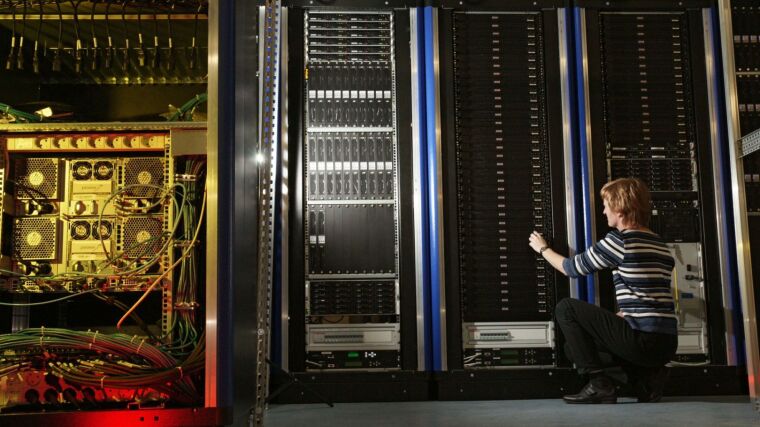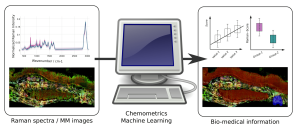
Prof. Dr. Thomas Bocklitz.
Image: Sven Döring / Leibniz-IPHT.Prof. Dr. Thomas W. Bocklitz studied physics and earned his PhD in Chemometrics from the Friedrich Schiller University Jena, Germany. He is head of a research department “Photonic Data Science” at the Leibniz-Institut of Photonic Technology and runs a research group at the Institute of Physical Chemistry. His research agenda is closely connected with the translation of physical measurements into bio-medical relevant information.
Research Areas
Dr. Bocklitz’s research interests are focused on the application of data science methods:
- Machine learning (ML) for photonic image data
- Chemometrics and ML for spectral data
- Correlation of different measurement methods and data fusion of the measurement data
Teaching Fields
Dr. Bocklitz teaches undergraduate courses in mathematics for chemistry (B.Sc.), as well as in fundamental physical chemistry (M.Sc. Chemistry). He gives lectures in chemometrics for M.Sc. Medical Photonics students and workshops in the JSMC.
Research Methods
The department headed by Dr. Bocklitz is theory-oriented. While the calculation equipment is constantly upgraded, computational methods are developed in-house and include:
Machine learning for photonic image data
- Classical machine learning methods
- Deep learning methods, like image classifiers, methods for semantic segmentation and GANs
- Data preprocessing and data standardization based on inverse modelling
Chemometrics and ML for spectral data
- Multivariate statistics and machine learning methods for spectral data
- Deep learning models for pretreatment and spectral analysis
- Data preprocessing and data standardization based on inverse modelling
Correlation of different measurement methods and data
fusion of the measurement data
- Data fusion of various data type combinations
- Co-registration and spatial correlation of measurements
Translation of physical measurements (Raman spectra and multimodal images) on the left side into biomedical information like diagnostic markers on the right side.
Picture: Bocklitz research group.Recent Research Results
The Bocklitz research group investigates the entire data life cycle of photonic data, which extends from data generation to data modelling, data learning and archiving. The data life cycle is considered in a holistic approach and methods and algorithms for experiment planning, sample size planning [1], data pre-treatment and data standardization [2] are investigated. These procedures are combined with chemometric procedures [3], model transfer methods [4] and artificial intelligence based techniques [5] in a data pipeline. This holistic approach allows the use of data from various photonic processes for material characterization and medical diagnostics. Further focal points of the research department are the data fusion of different heterogeneous data sources [6], the simulation of different measurement procedures in order to optimize correction procedures, methods for the interpretation of analysis models [7] and the construction of data infrastructures for different photonic measurement data, which guarantee the FAIR principles [8].
[1] Ali et al., Analytical Chemistry 90, 12485 (2018).
[2] Houhou et al., Optics Express 28, 21002 (2020).
[3] Guo et al., Molecular Sciences and Chemical Engineering, Elsevier (2020).
[4] Guo et al., Analytical Chemistry 90, 9787(2018).
[5] Pradhan et al., J. of Biophotonics 13, e201960186 (2020).
[6] Ryabchykov et al., Frontiers in Chemistry 6, 257 (2018).
[7] Bocklitz et al., ICPRAM 1, 874 (2019).
[8] Steinbeck et al., Research Ideas and Outcomes 6, e55852 (2020).

